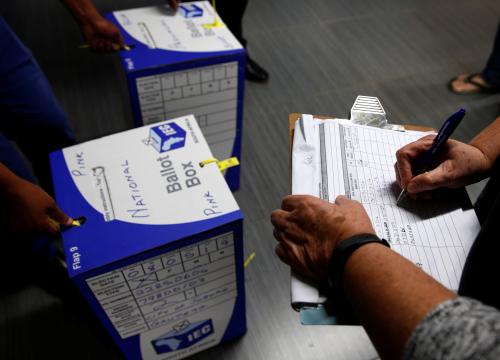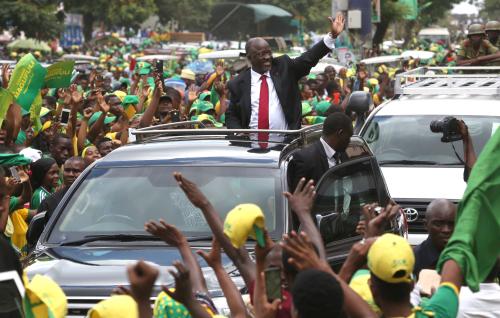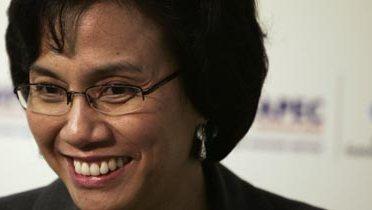Vote Counting Continues in Zambia’s Presidential Elections
As of 4:00 pm in Lusaka on Friday, January 23, Edgar Lungu, the presidential candidate of Zambia’s ruling Patriotic Front party, narrowly leads Hakainde Hichilema from the opposing United Party for National Development, by less than two percentage points (48.72 to 46.85 percent, respectively). The Electoral Commission has tallied votes from 121 of 150 constituencies, and the winner of the election is expected to be announced on Saturday. Voting began on Tuesday and was extended through Friday as torrential rains disrupted polling in some areas, contributing to low voter turnout estimated at 34 percent. The newly elected president will serve the remainder of the late President Michael Sata’s term in office, until elections are held again in September 2016. Mining firms in particular are closely monitoring the outcome of the election since it is thought a win for Lungu could mean the continuation of a newly implemented law that significantly increased taxes on mining operations—a law that Hichilema promised to revise if he were elected.
Protests Influence Key Vote on National Census in the DRC
Since Monday, January 19, protestors have assembled in Kinshasa and Goma against a draft law calling for a national census to be completed prior to the next presidential elections—currently scheduled for 2016—effectively delaying them by three or more years. Challengers to the bill, which was passed in the lower house of parliament on Saturday, argue that this law would enable President Joseph Kabila to stay in office beyond his current five-year mandate, despite the fact that the Congolese constitution bars presidents from serving more than two five-year terms. A Senate vote on the bill was scheduled to be held on Thursday, January 22, but was delayed until Friday, as demonstrations grew increasingly violent. On Thursday, police reportedly opened fire on hundreds of protestors in Goma, killing as many as 42 people according to the International Federation of Human Rights, although the government has disputed these figures.
On Friday, January 23, the Senate voted to amend the bill so that the census and updating of the electoral list must be finalized by 2016, in time for the elections. Policymakers in the House and Senate will now work to find a compromise between the two versions of the bill, which will be up for a final vote sometime next week.
IMF and World Bank Forecast Further African Growth in 2015 and 2016
This week, the International Monetary Fund (IMF) and World Bank released their latest projections for economic growth in sub-Saharan Africa, which they predict will remain robust through 2016. In its World Economic Outlook Update, launched on Tuesday, the IMF estimates that sub-Saharan Africa grew at 4.8 percent in 2014 and would experience further growth in 2015 and 2016 at rates of 4.9 and 5.2 percent respectively. However, the 2015 and 2016 figures have been downwardly revised by -0.9 and -0.8 percent since the IMF made its last projections in October 2014, due to the slump in oil and commodity prices, which have especially affected two of the continent’s economic powerhouses—Nigeria, the region’s largest oil producer, and South Africa, which is vulnerable to low commodity prices and has experienced large-scale industrial action, rolling blackouts and waning investor confidence in 2014, further weakening its economy. Meanwhile, the World Bank anticipates accelerated growth for sub-Saharan Africa from 4.5 percent in 2014 to 5.1 percent in 2017, owing to a rise in investment for infrastructure projects and increased productivity in the agriculture and services sectors. Yet, the World Bank also foresees possible challenges to growth posed by a renewal in the spread of Ebola, terrorist threats in West and East Africa, depressed commodity prices and unstable global financial conditions. To reduce the likelihood and impact of these risks, the World Bank proposes that African policymakers limit their budgets, restore fiscal buffers and allocate spending toward more productive sectors, including infrastructure.



Commentary
Africa in the News: Zambia Votes, the DRC Amends Controversial Bill amid Protests, and the IMF and World Bank Predict Stable Growth for Africa in 2015-2016
January 23, 2015